Experience the Peaceful Atmosphere of Fayuan Temple: Tips for Your Visit
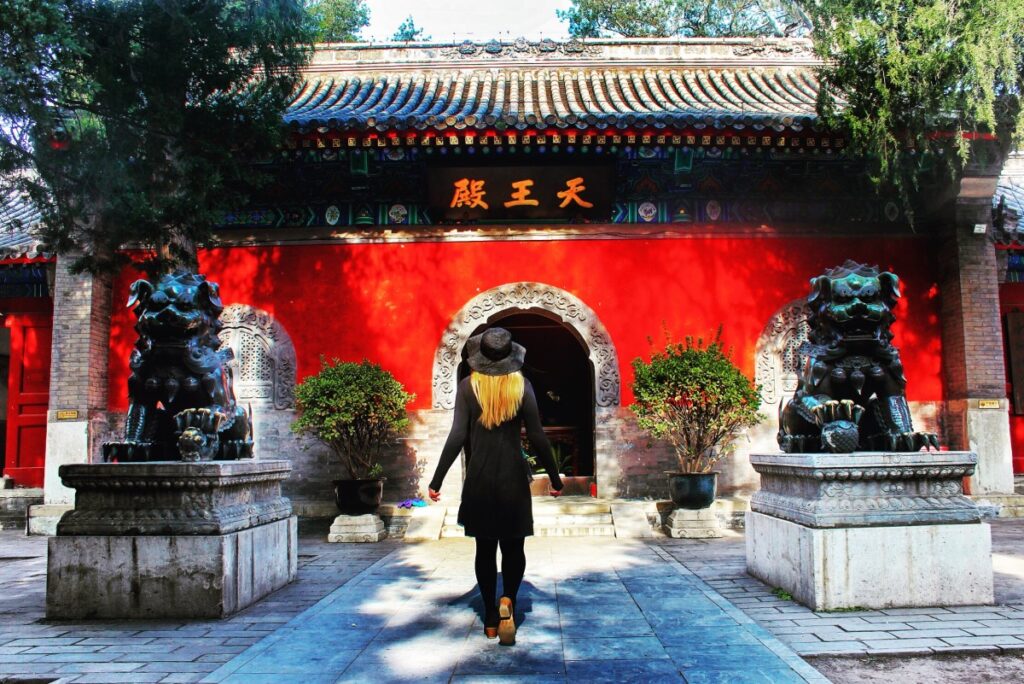
An Essential Guide to Visiting Fayuan_Temple
Nestled in the heart of Beijing, Fayuan Temple (法源寺) stands as a tranquil oasis amid the bustling cityscape, inviting visitors to pause and reflect. Dating back to the Tang Dynasty in 645 AD, this ancient temple is one of the city’s oldest and most revered Buddhist sites, rich in history and cultural significance. Here, the air is imbued with the scent of incense, the soft murmur of prayer, and the vibrant hues of traditional architecture, all blending harmoniously to create a serene atmosphere.
As you wander through the temple’s sacred grounds, you’ll be captivated by its exquisite architectural features, showcasing the artistry of past dynasties. The majestic Mahavira Hall, adorned with intricate carvings and housing a stunning statue of Sakyamuni Buddha, is a must-see for those seeking both aesthetic beauty and spiritual solace. Fayuan Temple not only serves as a place of worship but also as a cultural hub, offering visitors a glimpse into Buddhist practices, meditation sessions, and community events.
Whether you are a devoted follower of Buddhism or simply a curious traveler looking to escape the city’s hustle and bustle, Fayuan Temple promises a unique experience that resonates with the essence of tranquility and enlightenment. Join us as we explore the intricate details and spiritual offerings of this hidden gem in Beijing!
In This Guide
- An Essential Guide to Visiting Fayuan_Temple
- The Rich History and Legends of Fayuan_Temple
- Main Highlights: What You Absolutely Can’t Miss
- Planning Your Visit: A Practical Guide
- Tickets: Prices, Booking, and Tips
- How to Get There: A Complete Transportation Guide
- Local Cuisine and Accommodation Nearby
- Frequently Asked Questions
- Final Thoughts on Your Trip
The Rich History and Legends of Fayuan_Temple
Fayuan Temple, one of Beijing’s oldest and most revered Buddhist temples, is a testament to the rich tapestry of Chinese history and spirituality. Its origins trace back to the Tang Dynasty, specifically to the year 645 AD. Established during a period marked by cultural flourishing and religious tolerance, the temple was initially built to honor the teachings of Buddhism, which was rapidly gaining prominence in China.
Throughout the centuries, Fayuan Temple has witnessed the ebb and flow of dynasties, each leaving their imprint on its structure and significance. While the temple has undergone numerous renovations and expansions, particularly during the Song and Ming dynasties, it has remarkably retained much of its original charm and architectural elegance. The intricate design elements reflect the artistry and craftsmanship of ancient Chinese artisans, showcasing traditional styles that echo the grandeur of the Tang, Song, and Ming eras.
The temple’s main hall, the Mahavira Hall, is a focal point of worship and reverence. Within its walls stands a magnificent statue of Sakyamuni Buddha, drawing visitors and devotees from near and far. This sacred space not only serves as a place of worship but also as a cultural hub for various Buddhist ceremonies and meditation practices. The serene ambiance invites personal reflection and spiritual exploration, making it a cherished sanctuary in the bustling heart of Beijing.
In addition to its architectural beauty and spiritual significance, Fayuan Temple is steeped in legends and folklore. One popular tale speaks of a monk who, through his unwavering devotion and insight, was able to communicate with celestial beings, guiding the faithful towards enlightenment. Such stories add a layer of mystique to the temple, captivating the imaginations of those who visit.
Beyond its walls, the temple is surrounded by a vibrant community that embraces both tradition and modernity. Nearby, the Niujie Mosque stands as a testament to the harmonious coexistence of different cultures and religions, reflecting the temple’s role within a diverse spiritual landscape.
Visiting Fayuan Temple is not merely an exploration of history; it is an opportunity to connect with the living traditions of Buddhism. The temple continues to thrive as a center for religious practice, cultural events, and a place where the essence of ancient teachings can be felt in every corner. For those seeking a deeper understanding of China’s spiritual heritage, a visit to Fayuan Temple promises a journey rich in history, legend, and tranquility.
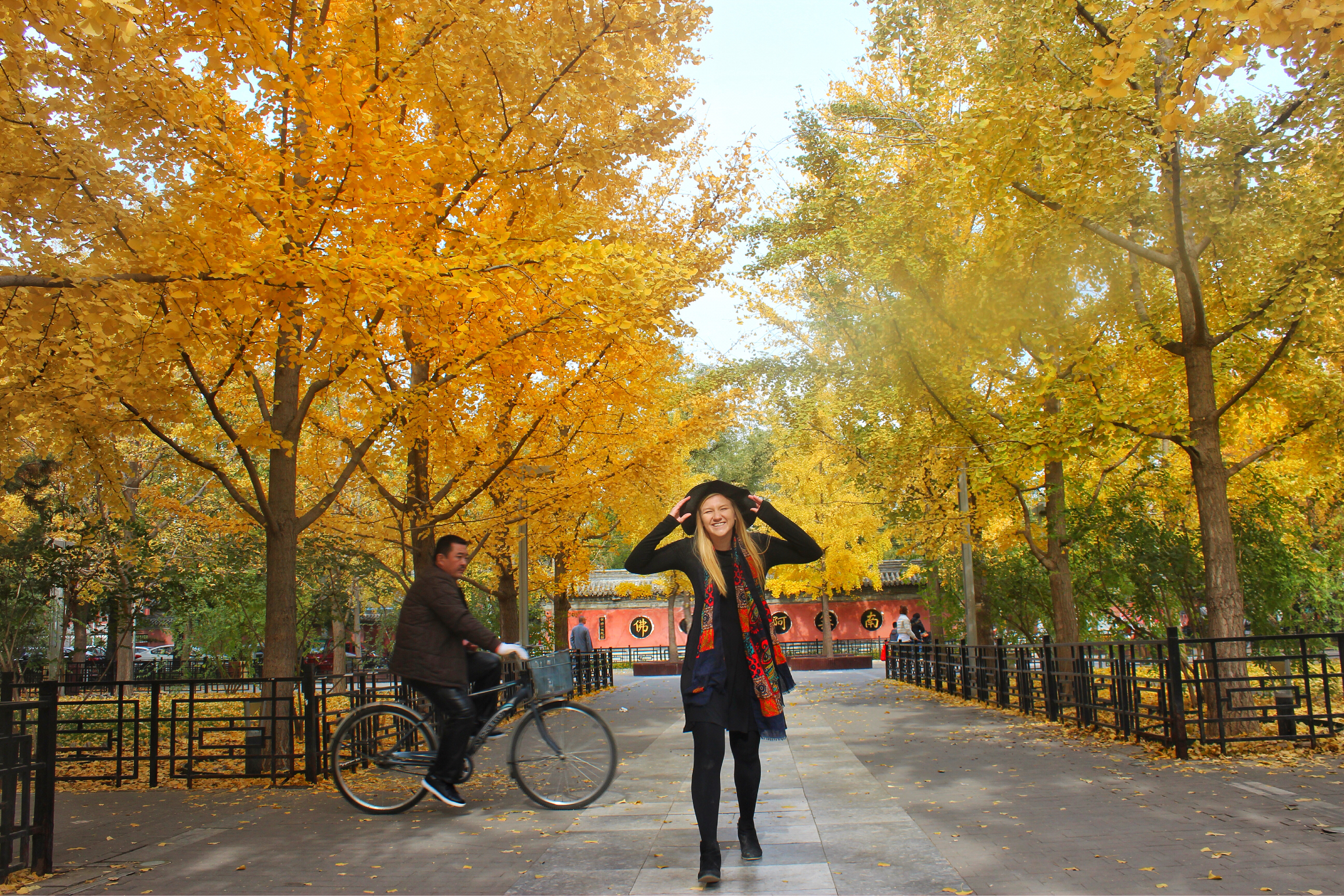
Fayuan_Temple.
Main Highlights: What You Absolutely Can’t Miss
Fayuan Temple, one of Beijing’s oldest Buddhist temples, is a treasure trove of history and spirituality. As you wander through its serene grounds, you’ll encounter a wealth of cultural and architectural marvels. Here are the key highlights you absolutely cannot miss during your visit:
Mahavira Hall (大雄宝殿)
The centerpiece of Fayuan Temple, the Mahavira Hall is a stunning architectural feat that houses the impressive statue of Sakyamuni Buddha. As you step inside, take a moment to appreciate the intricate wooden carvings and vibrant paintings that adorn the hall. The calm atmosphere invites contemplation, making it an ideal spot for meditation and reflection.
Mahavira Hall of the Future Buddha (大方广佛殿)
This hall is dedicated to Maitreya Buddha, known as the future Buddha. Adorned with exquisite Buddhist paintings and statues, the Mahavira Hall offers a tranquil setting for worship and meditation. The serene ambiance and spiritual energy make this hall a must-visit for those seeking a deeper understanding of Buddhist teachings.
Tripitaka Pavilion (藏经阁)
A hidden gem within the temple complex, the Tripitaka Pavilion is a repository of ancient Buddhist texts and scriptures. Here, visitors can explore a vast collection of literature that provides invaluable insights into Buddhist philosophy. This is a perfect stop for those interested in the scholarly aspect of Buddhism and its historical texts.
Bell and Drum Towers (钟鼓楼)
These striking structures are not only visually impressive but also serve as symbols of historical significance. Traditionally used for timekeeping and marking important events, the Bell and Drum Towers offer panoramic views of the surrounding area. Climbing to the top rewards you with breathtaking vistas, making the effort worthwhile.
Garden Courtyard (庭院花园)
Escape the hustle and bustle of Beijing in the peaceful garden courtyard of Fayuan Temple. This beautifully landscaped area is adorned with lush greenery, vibrant flowers, and tranquil water features. It provides the perfect setting for relaxation, allowing visitors to immerse themselves in the natural beauty and serenity of the temple grounds.
Cultural and Religious Practices
Fayuan Temple is not just a historical site; it is a living center for Buddhist practice. Throughout the day, you may witness various ceremonies, meditation sessions, and cultural performances. Engaging in these activities offers a unique opportunity to deepen your understanding of Buddhist philosophy and experience personal growth in a nurturing environment.
Nearby Attractions
After exploring Fayuan Temple, consider visiting the nearby Niujie Mosque, a stunning example of Islamic architecture that reflects the harmonious coexistence of different cultures in China. Additionally, the surrounding streets are filled with opportunities to sample authentic Beijing cuisine, enhancing your overall experience in this vibrant area.
With its rich history, stunning architecture, and tranquil atmosphere, Fayuan Temple is a highlight of any visit to Beijing. Be sure to immerse yourself fully in the experience, allowing the temple’s spiritual essence to resonate within you.
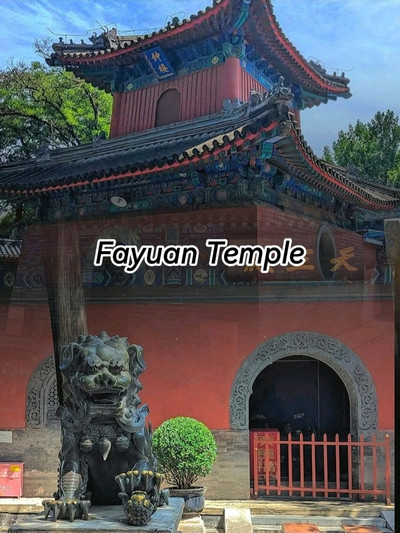
Fayuan_Temple.
Planning Your Visit: A Practical Guide
Visiting the Fayuan Temple in Beijing is an enriching experience that offers a glimpse into China’s deep cultural and religious heritage. This guide will help you navigate your visit, ensuring that you make the most of your time at this historic site.
Opening Hours
Fayuan Temple is open to visitors from 9:00 AM to 4:30 PM, except on Mondays when it is closed. It’s advisable to arrive earlier in the day to avoid crowds and fully soak in the serene atmosphere.
Getting There
The temple is located at No. 7 Fayuan Temple, Xicheng District, Beijing. The easiest way to reach it is by taking Subway Line 4 to Ping’anli Station. From there, it’s about a 10-minute walk to the temple. Make sure to check the local subway schedules, as they can vary, especially on weekends and holidays.
What to Expect
As you step through the gates of Fayuan Temple, you’ll be greeted by breathtaking architecture dating back to the Tang Dynasty. The temple complex showcases a blend of styles influenced by the Tang, Song, and Ming dynasties. The Main Hall (Mahavira Hall), housing a magnificent statue of Sakyamuni Buddha, is the centerpiece of the temple and a must-see.
Key Attractions:
- Main Hall (大雄宝殿): Admire the intricate carvings and tranquil ambiance.
- Mahavira Hall (大方广佛殿): Dedicated to the Maitreya Buddha, this hall is a peaceful spot for meditation.
- Tripitaka Pavilion (藏经阁): A treasure trove of ancient Buddhist texts, perfect for those interested in deepening their understanding of Buddhist philosophy.
- Bell and Drum Towers (钟鼓楼): These structures not only mark time but also provide historical context and beautiful views of the surroundings.
- Garden Courtyard (庭院花园): Relax in the lush garden, a tranquil oasis amid the city’s hustle and bustle.
Cultural Practices
Fayuan Temple serves as an active place of worship, and visitors may have the opportunity to witness Buddhist ceremonies or participate in meditation sessions. Engaging in these activities can provide a deeper understanding of Buddhist teachings and offer moments of reflection and calm.
Nearby Attractions
After exploring the temple, consider visiting the Niujie Mosque, just a short walk away. This mosque beautifully represents the blend of Islamic and Chinese cultures. Additionally, the surrounding area offers various eateries where you can savor authentic Beijing cuisine.
Tips for Your Visit
- Language: While the temple is not heavily tourist-oriented, English signs may be scarce. Consider downloading a translation app or bringing a phrasebook to enhance your experience.
- Dress Code: As a place of worship, it’s respectful to dress modestly. Avoid shorts and sleeveless tops.
- Photography: Be mindful of monks and worshippers, and always ask for permission before photographing individuals, especially during ceremonies.
- Time Management: Allocate at least 1-2 hours for your visit, allowing extra time for reflection in the gardens or participation in any ongoing activities.
Final Thoughts
Visiting Fayuan Temple is not just about sightseeing; it’s an opportunity for personal exploration and cultural immersion. Whether you’re drawn by the architectural beauty, the spiritual atmosphere, or the rich history, Fayuan Temple promises a memorable experience in the heart of Beijing.
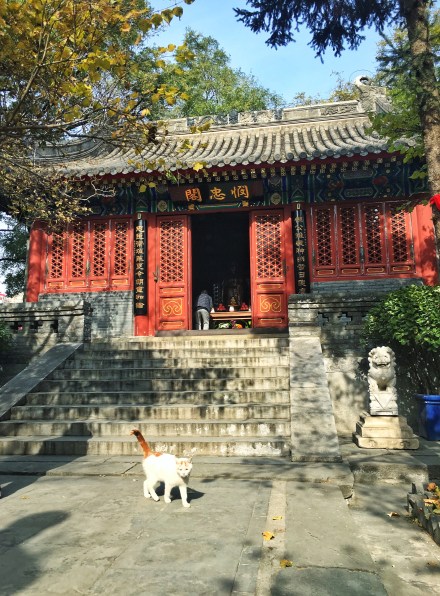
Fayuan_Temple.
Tickets: Prices, Booking, and Tips
When planning your visit to Fayuan Temple in Beijing, it’s essential to know about ticket prices, booking options, and some handy tips to enhance your experience.
Admission Costs
Visiting Fayuan Temple is budget-friendly, as there is no entrance fee for international travelers. This makes it an excellent choice for those looking to immerse themselves in the rich history and spirituality of one of Beijing’s oldest Buddhist temples without spending a dime.
Opening Hours
Fayuan Temple welcomes visitors daily from 9:00 AM to 4:30 PM, except on Mondays when it is closed. Be sure to arrive well before closing time to fully explore the temple complex and partake in any ongoing religious ceremonies or cultural activities.
Getting There
The temple is easily accessible via public transportation. Take Subway Line 4 to Ping’anli Station, from which it’s about a 10-minute walk to the temple entrance. If you’re coming from other parts of the city, consider using a taxi or a ride-hailing app, but be prepared for potential traffic delays.
Tips for Your Visit
- Respect the Environment: As a place of worship, maintain a respectful demeanor. Keep noise levels low and be mindful of the monks and worshippers.
- Language Considerations: Although the temple is frequented by locals, English signage may be limited. Consider downloading a translation app or bringing along a phrasebook to help you navigate and understand the surroundings better.
- Cultural Activities: Check for any scheduled events or ceremonies during your visit. Participating in a meditation session or observing a Buddhist ritual can provide deeper insights into the practices and philosophies of Buddhism.
- Photography Etiquette: While photography is generally allowed, be considerate and ask for permission if you wish to photograph monks or worshippers.
- Nearby Attractions: After your visit to Fayuan Temple, take the opportunity to explore nearby attractions, such as the Niujie Mosque, or indulge in some authentic Beijing cuisine at local eateries.
By keeping these points in mind, your visit to Fayuan Temple will be both enriching and memorable, allowing you to connect with the spiritual heart of Beijing. Enjoy your journey through this tranquil oasis amidst the bustling city!
How to Get There: A Complete Transportation Guide
Fayuan Temple, one of the oldest Buddhist temples in Beijing, offers a serene escape from the bustling city. If you’re planning a visit, here’s a comprehensive guide on how to get there, ensuring a smooth journey to this historical site.
Address
Fayuan Temple is located at No. 7 Fayuan Temple, Xicheng District, Beijing, China (中国北京市西城区法源寺7号).
By Subway
Using Beijing’s efficient subway system is one of the easiest ways to reach Fayuan Temple.
- Board Subway Line 4: Head to any station on Line 4 and travel towards Ping’anli Station.
- Disembark at Ping’anli Station: Once you arrive, take the exit for Caishikou.
- Walking Directions: From the station, it’s approximately a 10-minute walk to the temple. Just follow the signs or use a map app for guidance.
By Bus
If you prefer traveling by bus, there are several routes that stop near Fayuan Temple.
- Bus Lines: Look for buses numbered 10, 37, 53, 59, 88, 101, and 109.
- Get Off: Alight at the “Fayuan Temple” bus stop. From there, you’ll find the temple within a short walking distance.
By Taxi
For a more direct route, consider taking a taxi.
- Hailing a Taxi: Taxis are readily available throughout Beijing. Ensure you have the temple’s address written in Chinese (法源寺, Xicheng District) to show to the driver.
- Estimated Fare: Depending on your starting point, the fare may vary, but expect to pay around 30-50 RMB from central areas.
By Bicycle
If you enjoy cycling, renting a bike can be a fun way to explore Beijing while making your way to the temple.
- Bike Rentals: Numerous bike-sharing services are available throughout the city. Look for stations near your location.
- Cycling Route: Use a navigation app to find the best cycling route to Fayuan Temple. The journey can be refreshing, especially if you travel through nearby parks.
Nearby Attractions
Once you’ve visited Fayuan Temple, consider exploring the surrounding area. The Niujie Mosque, a beautiful fusion of Islamic and Chinese architecture, is just a short walk away. Additionally, the vibrant streets nearby offer a chance to indulge in authentic Beijing cuisine.
Tips for Your Visit
- Temple Hours: Fayuan Temple is open from 9:00 AM to 4:30 PM, except on Mondays, so plan your visit accordingly.
- Language: While signs in English may be limited, the tranquil atmosphere and breathtaking architecture will speak volumes.
With these transportation options and tips, your journey to Fayuan Temple will be both easy and enjoyable. Embrace the opportunity to explore this historical gem nestled in the heart of Beijing!
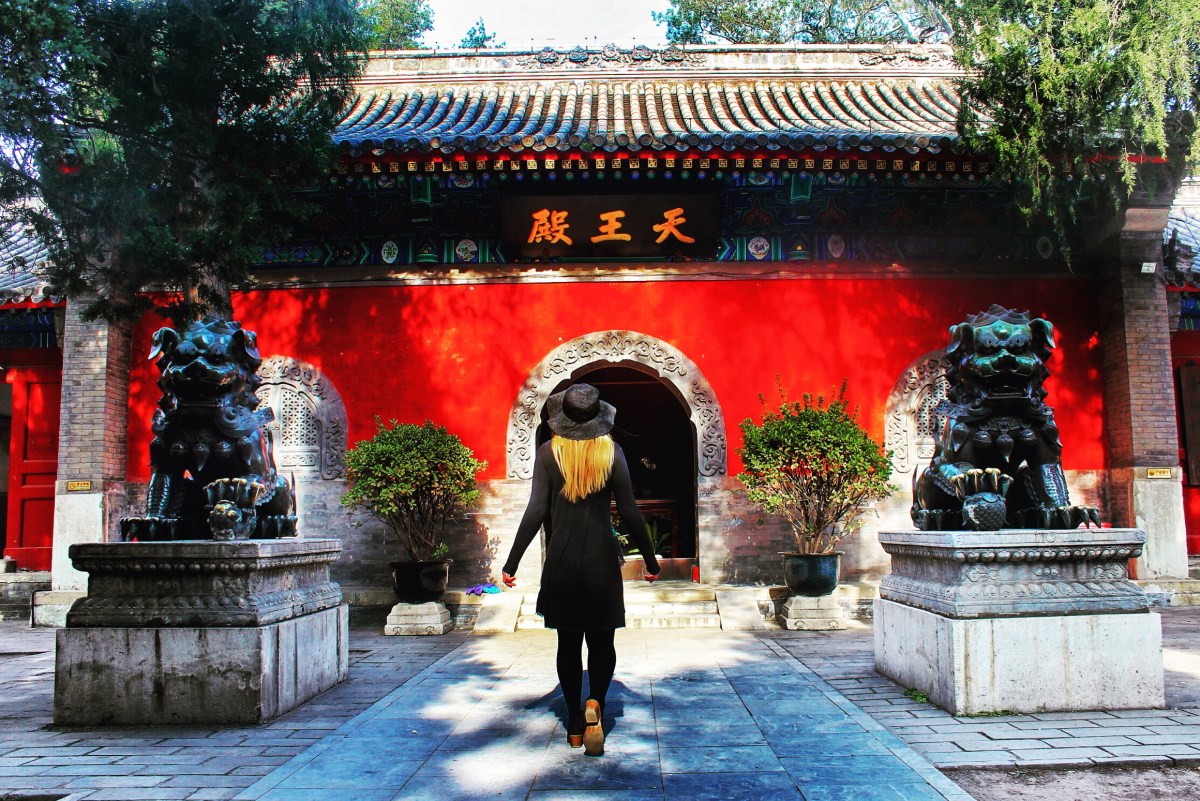
Fayuan_Temple.
Local Cuisine and Accommodation Nearby
Exploring the area surrounding Fayuan Temple not only offers a glimpse into its rich history and serene ambiance but also provides delightful culinary experiences and comfortable accommodations for international travelers.
Culinary Delights
Ju BaoYuan (Ju Bao Yuan NiuJie XiLi)
Just a stone’s throw from the temple, this highly-rated restaurant is famous for its authentic Xinjiang cuisine, particularly its succulent lamb dishes. The warm, inviting atmosphere makes it a great spot to enjoy a hearty meal after your temple visit.
Fayuan Temple Vegetarian Food
For those seeking a plant-based option, the vegetarian food stall right at the temple serves delicious, wholesome dishes that align with Buddhist dietary practices. Here, you can savor fresh vegetables and flavorful tofu prepared in traditional ways.
Bai Ji NianGao (ShuRu HuTong)
Situated nearby, Bai Ji NianGao offers a casual dining experience with a menu full of traditional Beijing snacks and comfort food. Their rice cakes are particularly popular among locals and visitors alike.
Alice’s Tea House
If you’re in the mood for a lighter meal or just a cozy place to relax, Alice’s Tea House is a charming café that serves Yunnan cuisine along with an impressive selection of teas. The tranquil ambiance is perfect for unwinding after a day of exploration.
QingZhen TuLuFan Restaurant
Located a short walk away, this restaurant specializes in halal dishes, making it an excellent choice for travelers looking for authentic Chinese flavors in a halal-friendly environment.
Places to Stay
Beijing Shijia Inn
For a cozy and affordable stay, consider the Beijing Shijia Inn. Located conveniently close to Fayuan Temple, this guesthouse provides a blend of traditional Chinese décor and modern amenities. It’s an ideal base for exploring the city while offering a peaceful retreat.
Beijing Qianyuan Hotel
A bit farther from the temple, the Beijing Qianyuan Hotel is known for its comfortable rooms and excellent service. This hotel combines modern comforts with a touch of traditional Chinese architecture, making it a great choice for travelers who appreciate cultural aesthetics.
Wangfujing Grand Hotel
For those willing to indulge, the Wangfujing Grand Hotel offers luxury accommodations with top-notch amenities. Located not too far from Fayuan Temple, the hotel features elegant rooms, a spa, and several dining options that highlight both local and international cuisine.
By blending cultural exploration with culinary experiences and comfortable accommodations, your visit to Fayuan Temple can be a truly enriching experience in the heart of Beijing.
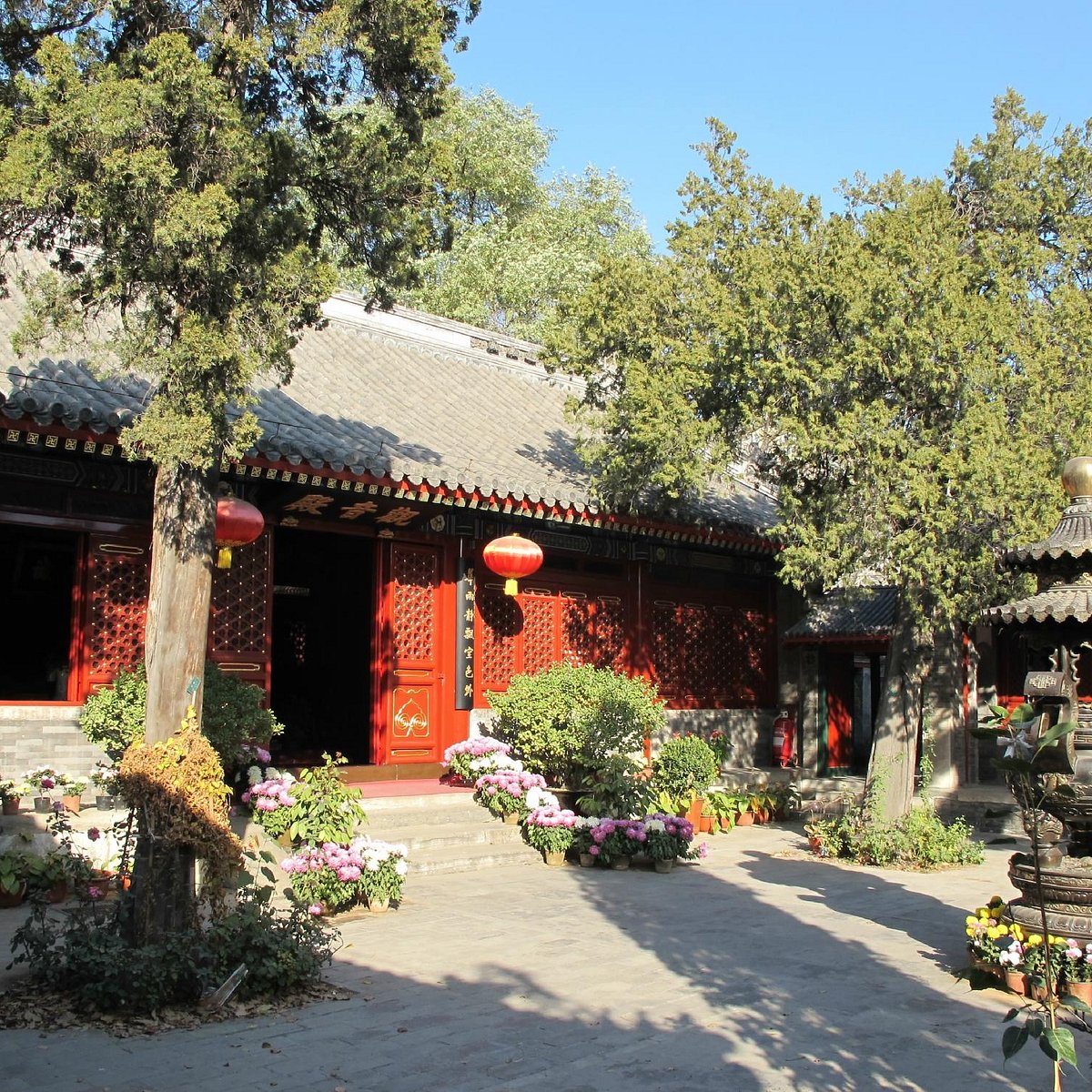
Fayuan_Temple.
Frequently Asked Questions
Frequently Asked Questions about Fayuan Temple
1. What are the visiting hours for Fayuan Temple?
Fayuan Temple is open from 9:00 AM to 4:30 PM every day, except on Mondays when it is closed. Plan your visit accordingly to fully experience this serene sanctuary.
2. How do I get to Fayuan Temple using public transport?
You can reach Fayuan Temple by taking Subway Line 4 to Ping’anli Station. From there, it’s about a 10-minute walk to the temple. Follow the signs or use a map app for guidance.
3. Is there an admission fee to enter the temple?
There is no admission fee to visit Fayuan Temple, making it an accessible destination for all travelers looking to explore its beauty and tranquility.
4. Are there any guided tours available at Fayuan Temple?
While there are no official guided tours within the temple, many local tour companies offer guided walking tours of the area, which may include a visit to Fayuan Temple along with other historical sites.
5. What should I wear when visiting Fayuan Temple?
Modest attire is recommended when visiting religious sites like Fayuan Temple. Avoid wearing revealing clothing, and if possible, wear comfortable shoes for walking around the temple grounds.
6. Can I take photographs inside the temple?
Photography is generally allowed in the temple, but it’s best to be respectful and avoid taking pictures during worship or meditation sessions. Always check for any specific signs indicating restrictions.
7. Are there facilities available for visitors at Fayuan Temple?
Fayuan Temple has basic facilities, including restrooms. However, be prepared for limited amenities, as it is primarily a place of worship rather than a tourist attraction.
8. What other attractions are nearby Fayuan Temple?
After visiting the temple, consider exploring the nearby Niujie Mosque, an architectural marvel that reflects the harmonious coexistence of Islam and Chinese culture. You can also find local eateries in the vicinity to enjoy authentic Beijing cuisine.
Final Thoughts on Your Trip
As you conclude your journey through the serene grounds of Fayuan Temple, take a moment to reflect on the profound experiences this ancient site has offered. Stepping into a space that has witnessed centuries of Buddhist devotion, you’ve not only explored stunning architectural marvels but also connected with a living tradition that thrives amidst the hustle and bustle of modern Beijing.
Whether it was the tranquil ambiance of the Mahavira Hall, the intricate artistry in the Tripitaka Pavilion, or the peaceful garden courtyard that allowed for quiet contemplation, each aspect of the temple invites a deeper understanding of both Buddhism and Chinese culture.
As you leave, consider indulging in the nearby culinary delights that Beijing has to offer or visiting the harmonious Niujie Mosque, a testament to the city’s rich tapestry of religions. Fayuan Temple is not just a destination; it’s a reminder of the spiritual journeys we all undertake. Let this experience inspire you to seek peace and reflection in your own travels and daily life. Safe travels as you continue your adventure in this vibrant city!